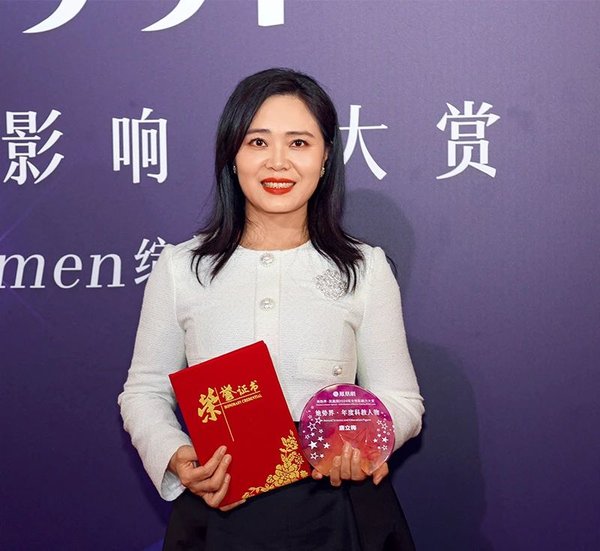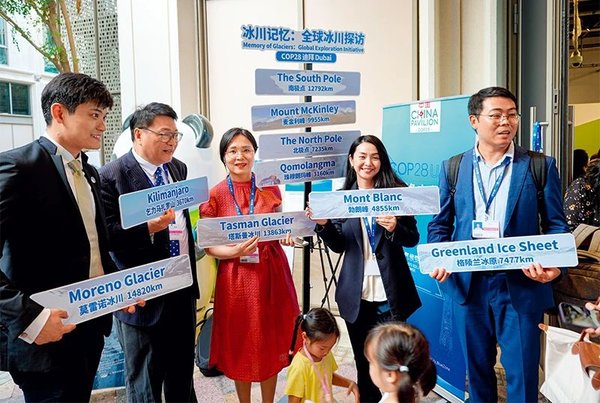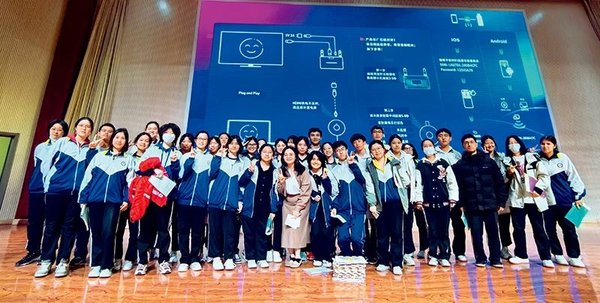Revealing Charm of Scientific Expedition to Youngsters

Tang Limei, a professor and doctoral supervisor with Northeast Petroleum University's School of Earth Sciences, in northeast China's Heilongjiang Province, was appointed by the Ministry of Natural Resources as a chief expert for communicating knowledge on natural resources in 2020. She is also a National March 8th Red-Banner Holder.
Tang holds a doctoral degree from east China's Zhejiang University, and she has 14 years of experience working in an institute of oceanography. Tang became China's first woman scientist to accumulate both deep-sea-diving and polar-expedition experiences. She descended to a depth of 2,774 meters, in the western Pacific Ocean, while aboard the manned deep-sea submersible Jiaolong during its first voyage of experimental application and the 72nd deep-dive mission, in 2013.

In 2017, she embarked on a 165-day scientific expedition of the Antarctic, aboard China's icebreaker, Xuelong. That 38,000-plus-nautical-mile journey, which concluded in 2018, was China's 34th exploration of the Antarctic. From the depths of the ocean to the world's icy polar regions, Tang's quest to explore has been never-ending.
While engaging in scientific expeditions, Tang constantly reflects on the responsibilities of scientists. "I am grateful for the opportunities to apply my expertise in exploring the oceans, polar regions, and the unknown. I will do my best to share my research outcomes with the public, and to have my research benefit society." Guided by this belief, Tang attaches equal importance to scientific research and science popularization, and she works diligently to transform scientific knowledge into popular-science works.
For more than a decade, Tang has participated in hundreds of activities, in dozens of cities, across the country, such as giving lectures to advance scientific knowledge. Tang's lectures are both professional and interesting. She outlines her expedition experiences, and also her reflections on both life and the origins of the universe. "For young people, science-related communications are not just about spreading knowledge; they also help foster scientific thinking, develop critical analysis, and spark innovation potential. Teenagers, by learning the stories of scientists, and scientific discoveries, will be inspired to embrace challenges, innovate, and make contributions to scientific development in the future," Tang explains.

Tang feels a sense of achievement whenever she receives a thank-you note from a youngster. "I was moved by a group of students from southwest China's Yunnan Province. They said they wanted to become someone like me ... Some other students said they wanted to work as a scientist in the future. This made me feel my efforts were truly meaningful. I helped them ignite their passion for science," says Tang.
Tang has written books to share her expedition experiences. In 2023, her popular-science book, Exploring the Deep Sea with Jiaolong, was published. The book outlines information about the ocean, China's deep-sea explorations, and the research and development of China's manned deep-sea submersible, Jiaolong. The book was included in a popular-science book series by the ACWF. In 2024, with ACWF's support, Tang donated more than 20,000 popular-science books to teenagers across the country. Tang says she looks forward to the publishing of her upcoming works, including Journey to Antarctica Aboard Xuelong, Climbing Mountains on the Ocean Floor, and Digging Rocks in Antarctica.

The revised Science and Technology Popularization Law took effect on December 25, 2024. The revised law shows China places equal importance on science popularization and scientific innovation, and that China is promoting integration of both initiatives. Tang agrees with the efforts. "Public awareness of front-line scientific research is limited. Scientific achievements belong to the whole society, and scientists should communicate their research outcomes to society. This will help the public gain a deeper understanding of the country's progress in developing cutting-edge technologies, and it will help build scientific literacy throughout society. By enhancing scientific literacy, especially among teenagers, young people will cultivate a passion for science and a spirit of inquiry. In the long run, they will contribute their strength to achieving greater breakthroughs in scientific development," Tang says.
"For scientists, participating in science popularization initiatives is a meaningful effort," Tang continues. "Scientists have a good command of the trends in scientific development. If they can communicate their knowledge in a down-to-earth and easily accessible way, they will help promote teenagers' growth. By engaging in scientific popularization, I am not going to turn everyone into a scientist; instead, I want to encourage more people to love science, and to develop the ability to think independently and critically. Therefore, I will continue doing what I am doing now, giving popular-science lectures, and writing popular-science books."
Photos from Interviewee
(Women of China English Monthly March 2025)
Editor: Wang Shasha
Please understand that womenofchina.cn,a non-profit, information-communication website, cannot reach every writer before using articles and images. For copyright issues, please contact us by emailing: website@womenofchina.cn. The articles published and opinions expressed on this website represent the opinions of writers and are not necessarily shared by womenofchina.cn.








.jpg)

 WeChat
WeChat Weibo
Weibo 京公网安备 11010102004314号
京公网安备 11010102004314号